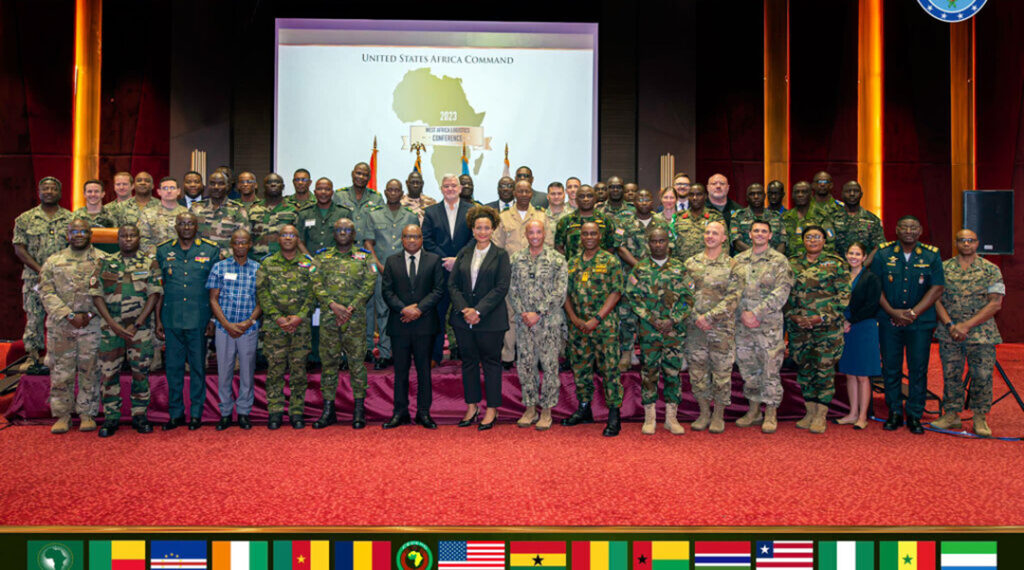ADF STAFF
Military logistics professionals from 13 West African nations met in Abidjan, Côte d’Ivoire, in September for the West Africa Logistics Conference hosted by the Ivoirian Armed Forces and United States Africa Command (AFRICOM).
Representatives from Benin, Cabo Verde, Cameroon, Chad, Côte d’Ivoire, The Gambia, Ghana, Guinea, Guinea-Bissau, Liberia, Nigeria, Senegal and Sierra Leone discussed solutions for common logistics and coordination challenges during the two-day conference that ended September 21.
“The meeting on West African Logistics offers an excellent framework for analyzing the challenges linked to the operational engagement of our forces,” Ivoirian Director of the Defense Ministry Jean Paul Koffi Malan said, according to a report by Agence Ivoirienne de Presse.
Logisticians plan and carry out the movement and maintenance of forces. They acquire, store, transport and dispose of materiel. They see to the construction and upkeep of facilities, and much more.
When troops are fed, clothed and armed, that means logisticians are getting the job done.
As Jessica Ba, U.S. Ambassador to Côte d’Ivoire, put it: “Logistics are the basis of military power.”
Discussions covered an array of topics, including improving institutional capabilities, the proactive use of logistical data to anticipate challenges and strengthen operational readiness, optimizing resource allocation, and effectively communicating logistical issues and their potential implications to senior leaders.
Attendees also discussed the nuances of preparing for and responding to crises, internally displaced populations, food shortages, the intricacies of natural disasters and pandemics.
“Regional military forces have an important role in working together to create logistics solutions that are durable, impactful and lasting,” said George Bresnihan, AFRICOM’s director for logistics. “The West Africa Logistics Conference offers an opportunity for logisticians from 13 West African nations, as well as the African Union and ECOWAS, to discuss shared challenges, collaborate, and work toward solutions together, and I look forward to continuing our partnerships.”
African militaries face a wide range of logistics challenges as they deploy forces into “the most operationally and logistically challenging conditions in the world,” according to a paper by retired Col. Daniel Hampton, professor of practice in security studies at the Africa Center for Strategic Studies (ACSS).
Because aspects of military operations can change quickly, logistics systems must be able to adapt to different scenarios, whether a mission is to relocate vulnerable populations, protect civilians, neutralize threats or ensure stability.
“There is no such thing as a typical mission,” Gerard de Groot, a history professor at the University of St. Andrews in Scotland, told ACSS. “An observer mission might require nothing more complex than some satellite phones, a few vehicles and some laptop computers. A large-scale pacification mission, on the other hand, needs food, clothing, weaponry, armored cars, ammunition, medical supplies, helicopters and transport planes.”
The continent’s huge size and inadequate infrastructure in some areas pose unique logistical challenges, especially when troops are deployed out of the country. A lack of strategic airlift makes it difficult to move and equip troops.
These issues present a “logistics nightmare” to military leaders, said retired Brig. Gen. David Baburam, who spent 36 years with the Kenya Defence Forces. In a 2018 interview with ADF, Baburam stressed the importance of logistics planning in advance of any mission.
“Often you think about logistics after, not before. That can undermine the entire operational planning because you can’t plan without considering what logistics you have,” he said. “You can’t get the troops to location ‘A’ or ‘B’ if you don’t have the means of air transport to take them there. You can’t keep troops in the operational area for three months if you can’t feed them or provide them with water or with the adequate provision of ammunition. So planning is key.”

